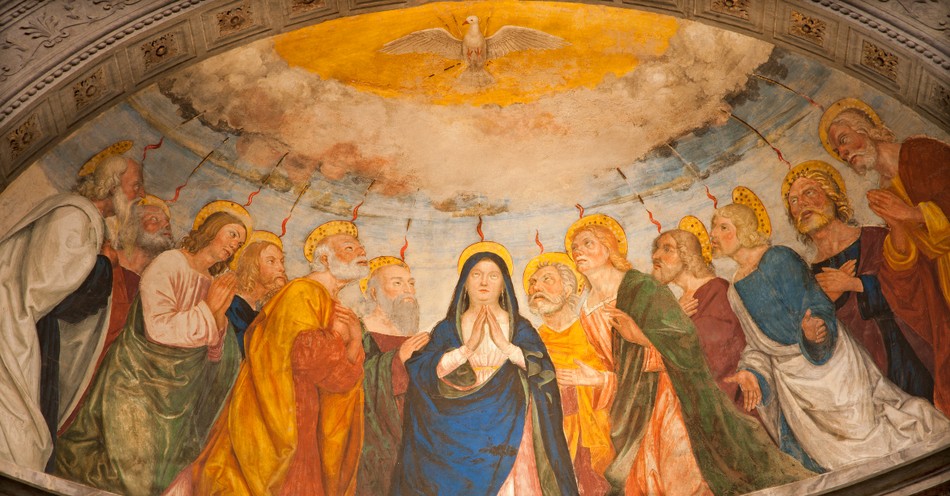Pentecost is a Jewish feast that has been celebrated since the Old Testament, being called the Feast of Harvest or the Feast of Weeks in Jewish tradition. It is mentioned in five places in the first five books — in Exodus 23, Exodus 24, Leviticus 16, Numbers 28, and Deuteronomy 16. 'Pentecost', the Greek name of this event, is also used to refer to the events in Acts 2 when the Holy Spirit intervened following Jesus' ascension to heaven. Discover the origin and significance of Pentecost in the Bible.
What is Pentecost?: Table of Contents
- When is Pentecost?
- Pentecost in the Bible
- Origin
- Importance in Christianity
- Significance Today
- Historical Insights
When Is Pentecost Sunday in 2024?
This year, Pentecost will be on Sunday, May 19th, 2024, observed on the seventh Sunday after Easter (March 31st).
Pentecost in the Bible
The Coming of the Holy Spirit
When the day of Pentecost arrived, they were all together in one place. And suddenly there came from heaven a sound like a mighty rushing wind, and it filled the entire house where they were sitting. And divided tongues as of fire appeared to them and rested on each one of them. And they were all filled with the Holy Spirit and began to speak in other tongues as the Spirit gave them utterance.
Now there were dwelling in Jerusalem Jews, devout men from every nation under heaven. And at this sound the multitude came together, and they were bewildered, because each one was hearing them speak in his own language. And they were amazed and astonished, saying, "Are not all these who are speaking Galileans? And how is it that we hear, each of us in his own native language? Parthians and Medes and Elamites and residents of Mesopotamia, Judea and Cappadocia, Pontus and Asia, Phrygia and Pamphylia, Egypt and the parts of Libya belonging to Cyrene, and visitors from Rome, both Jews and proselytes, Cretans and Arabians--we hear them telling in our own tongues the mighty works of God." And all were amazed and perplexed, saying to one another, "What does this mean?" But others mocking said, "They are filled with new wine." (Acts 2:1-13)
What is the Origin of Pentecost?
Pentecost was the celebration of the beginning of the early weeks of harvest. In Palestine, there were two harvests each year. The early harvest came during the months of May and June; the final harvest came in the Fall. Pentecost was the celebration of the beginning of the early wheat harvest, which meant that Pentecost always fell sometime during the middle of the month of May or sometimes in early June.
There were several festivals, celebrations, or observances that took place before Pentecost. There was Passover, there was Unleavened Bread, and there was the Feast of Firstfruits. The Feast of Firstfruits was the celebration of the beginning of the barley harvest. Here's the way you figured out the date of Pentecost.
According to the Old Testament, you would go to the day of the celebration of Firstfruits, and beginning with that day, you would count off 50 days. The fiftieth day would be the Day of Pentecost. So Firstfruits is the beginning of the barley harvest and Pentecost is the celebration of the beginning of the wheat harvest.
Since it was always 50 days after Firstfruits, and since 50 days equals seven weeks, it always came a "week of weeks" later. Therefore, they either called it the Feast of Harvest or the Feast of Weeks.
Why Is Pentecost Important to Christianity?
Modern Christians observe Pentecost as a holiday, not to celebrate a wheat harvest, but to remember when the Holy Spirit invaded the Church in Acts 2.
1. On Pentecost Sunday, the Holy Spirit filled the Church with power and added 3,000 new believers. The account in Act 2 reports that, after Jesus ascended into heaven, Jesus’ followers were gathered together for the Feast of Harvest (aka Pentecost), and the Holy Spirit “filled the whole house where they were sitting” (Acts 2:2). “All of them were filled with the Holy Spirit and began to speak in other tongues as the Spirit enabled them” (Acts 2:4).
This strange occurrence drew a large crowd, and Peter stood up to speak to them about repentance and the gospel of Christ (Acts 2:14). By the end of the day that the Holy Spirit came, the Church grew by 3,000 people (Acts 2:41). This is why Christians still celebrate Pentecost.
John Gill expresses the significance in his commentary:
“Through this baptism of the Holy Ghost and fire, the apostles became more knowing, and had a greater understanding of the mysteries of the Gospel, and were more qualified to preach it to people of all nations and languages.”
2. The Holy Spirit was prophesied in the Old Testament and promised by Jesus. Jesus promised the Holy Spirit in John 14:26, who would be the Helper for his people.
“But the Helper, the Holy Spirit, whom the Father will send in My name, He will teach you all things, and bring to your remembrance all that I said to you.”
This New Testament event is also significant because it fulfills an Old Testament prophecy in Joel 2:28-29:
“And afterward, I will pour out my Spirit on all people. Your sons and daughters will prophesy, your old men will dream dreams, your young men will see visions. Even on my servants, both men and women, I will pour out my Spirit in those days.”
The Significance of Pentecost Today
In a video for Christianity.com, Phillip Nation explains why Pentecost is significant for Christians today. Read the transcript of that interview below:
The significance of Pentecost to the church is something that we need to walk through carefully, and we shouldn't ignore, because Pentecost was a Jewish celebration. And so in our modern day of the New Testament church, we don't celebrate Pentecost in the way that the Old Testament Hebrews did.
But Pentecost was the moment in history after Christ had ascended. And he had promised during the gospel narratives, during his earthly ministry, that he would leave, but that he would send the comforter, he would send the holy spirit. And it was at that moment in Pentecost where the spirit came, and he empowered the early believers, specifically the apostles that were left, and Peter, who is almost a comedic personality in the gospel narratives.
He is the one who constantly puts his foot in his mouth, constantly is having to be corrected by Jesus, but is in the inner circle. And because of grace and mercy, he is chosen to be the one who stands up in front of this throng, probably thousands, maybe tens of thousands of people to proclaim the gospel, there in the midst of a Hebrew celebration that was intended to remind the Hebrews of how God had always protected them.
And here Peter stands up and says, "And let me tell you about the Messiah, who is the eternal protection for all of humanity. Let me tell you who he is." And so Pentecost becomes this marker in history to really what many people would say, "And that's the moment that church is born."
That is when thousands come into the faith. And it goes from this little sect of believers who followed a Jewish rabbi from Nazareth who died and rose again, and suddenly the church breaks forth into the culture. Suddenly it is that unstoppable force that no one can really deny any longer. Pentecost has taken on a new significance for us. It, at one point, is just a historical memory. Now it is the living reality of the moment that the spirit of God seemingly burst forth.
Use our Prayer for Pentecost Sunday to call on the Holy Spirit for guidance and faith.
3 Historical Insights into Pentecost
There are three things you need to know about Pentecost that will help you understand Acts 2.
1. Pentecost was a pilgrim festival. That meant that according to Jewish Law, all the adult Jewish men would come from wherever they were living to Jerusalem and personally be in attendance during this celebration.
2. Pentecost was a holiday. No servile work was to be done. Schools were out. The shops were closed. It was a day to celebrate.
3. There were certain celebrations and sacrifices and offerings which were prescribed in the Law for the day of Pentecost. On Pentecost, the High Priest was to take two loaves of freshly baked wheat bread and offer them before the Lord. The wheat bread was made from newly harvested wheat.
In short, Pentecost in the time of the Apostles was a great and grand harvest celebration. The streets of Jerusalem were clogged with thousands of pilgrims who had come from every point of the compass to celebrate the goodness of God and the bringing in of the wheat harvest.
Read more Bible Verses about Pentecost from BibleStudyTools.com
Excerpted from "The P.U.I.H." from Keep Believing Ministries (used by permission).
Photo credit: GettyImages/sedmak









